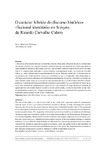Mostrar o rexistro simple do ítem
O carácter híbrido do discurso histórico-ficcional identitario en Scórpio, de Ricardo Carvalho Calero
| dc.contributor.author | Martínez Teixeiro, Alva | es_ES |
| dc.date.accessioned | 2014-10-02T12:18:14Z | |
| dc.date.available | 2014-10-02T12:18:14Z | |
| dc.date.issued | 2012 | es_ES |
| dc.identifier.citation | Novas achegas ao estudo da cultura galega II. Enfoques socio-históricos e lingüístico-literarios; 2012: 267-277. ISBN: 978-84-9749-517-2 | es_ES |
| dc.identifier.isbn | 978-84-9749-517-2 | es_ES |
| dc.identifier.uri | http://hdl.handle.net/2183/13235 | |
| dc.description.abstract | [Resumo] É obxectivo deste estudo analizar e interpretar unha das obras máis relevantes da novela contemporánea galega, Scórpio, con especial atención á historia galega, coa intención de reflexionar sobre as particularidades inherentes dos temas, motivos e mecanismos retóricos usados por Ricardo Carvalho Calero. A complexidade atribuída á novela histórica contemporánea atopou na escrita de Carvalho Calero un terreo óptimo para a experimentación de novas fórmulas narrativas. A orixinalidade da novela deriva da condensación de trazos revolucionarios na que é considerada unha forma narrativa híbrida (o autor supera a dicotomía ficción/historia considerando a biografía, a historia e a ficción non como opostos, senón como un contínuum de prácticas discursivas) e cun claro fondo subversivo (recordemos que é parte da ideoloxía posmoderna cuestionar a autoridade). Scórpio ofrécelle ao lector actual unha serie ilimitada de interpretacións significativas; por exemplo, en lugar da procura moderna de significado no noso mundo caótico, o autor evita esta posibilidade, e a novela convértese nunha parodia problemática desta busca. A fragmentariedade na narración e na construción de caracteres é un dos elementos centrais dunha novela difícil e ambiciosa. | es_ES |
| dc.description.abstract | [Abstract] The aim of this paper is to take a closer look at one of the most important works of contemporary Galician novel, Scórpio, with particular reference to Galician History, in order to highlight the specific characteristics of themes, forms and rhetorical devices used by Ricardo Carvalho Calero. The complexity of the contemporary historical novel found in Carvalho Calero’s writing a fertile ground for experiment on new narrative forms. The originality of his novel derives from his ability to condense revolutionary features in what was considered a hybrid fiction (the writer mediates the fiction/history dichotomy by envisioning biography, History and fiction not as distinct and separate opposites, but as a continuum of discursive practices) with a marked subversive subtext (as part of the postmodern ideology to question authority). Scórpio offers the modern reader an endless series of interesting interpretations; for example, instead of the modernist quest for meaning in a chaotic world, the author eschews the possibility of meaning, and the novel turns into a problematic parody of this quest. The fragmentariness in narrative and character-construction is a central element of a difficult and ambitious novel. | es_ES |
| dc.language.iso | glg | es_ES |
| dc.publisher | Universidade da Coruña | es_ES |
| dc.subject | Carvalho Calero, Ricardo | es_ES |
| dc.subject | Scórpio | es_ES |
| dc.subject | Novela | es_ES |
| dc.subject | Historia | es_ES |
| dc.subject | Polifonía | es_ES |
| dc.subject | Novel history | es_ES |
| dc.subject | Polyphony | es_ES |
| dc.title | O carácter híbrido do discurso histórico-ficcional identitario en Scórpio, de Ricardo Carvalho Calero | es_ES |
| dc.type | info:eu-repo/semantics/conferenceObject | es_ES |
| dc.rights.access | info:eu-repo/semantics/openAccess | es_ES |






